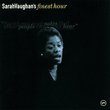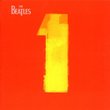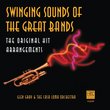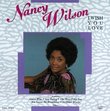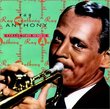| All Artists: Georgia Gibbs Title: Best of Mercury Years Members Wishing: 1 Total Copies: 0 Label: Polygram Records Release Date: 8/20/1996 Album Type: Original recording remastered Genres: Pop, Broadway & Vocalists Styles: Easy Listening, Oldies, Vocal Pop, Traditional Vocal Pop Number of Discs: 1 SwapaCD Credits: 1 UPCs: 731453287228, 731453287242 |
Search - Georgia Gibbs :: Best of Mercury Years
 | Georgia Gibbs Best of Mercury Years Genres: Pop, Broadway & Vocalists
|
CD DetailsSimilarly Requested CDs
|
CD ReviewsThe underrated vocal versatility and power of Georgia Gibbs Burnsu2@aol.com | DeKalb,Il USA | 07/26/1998 (5 out of 5 stars) "I grew up listening to many of my parents 78rpm records. One of my favorie singers was Georgia Gibbs. I loved her soaring voice and the way she was able to tackle any type of song - rock, country, ballad, ect. As opposed to many female vocalists of the 50's, Georgia Gibbs was versitile. For many years, I searched for more records by Georgia Gibbs - and this was not an easy task. I was able to find many of the songs on this album, however the condition of the records was usually not very good. This CD from Mercury Records is FANTASTIC! "Kiss Of Fire" is, without a doubt, a classic. Just as classic are "Tweedle Dee" and "Dance With Me Henry" - although there are many who feel that these two songs were stolen, Georgia Gibbs versions of these songs are perfect and, upon listening to them, it is hard to take anything away from the quality of her work. "I Love Paris" is sung perfectly, with little fanfare. You could listen to "I Want You To Be My Baby" a hundred times and not tire of it. "How Did He Look?" is full of longing - but again, not overdone. Just enough to make you feel a little lump in your throat. Georgia Gibbs is the most underrated female vocalist of the 1950's and I applaud Mercury for putting this collection together. If you are in the mood to listen to a truely talented artist, one whos voice knows few limits in terms of style and emotion, this CD is a perfect fit. I hope Mercury issues a Volume 2 and some of the other labels Ms. Gibbs has recorded for will take heed and reintroduce Her Nibs to a new generation." The Voice I Fell In Love With Michael Pendragon | New York, NY United States | 12/27/2002 (5 out of 5 stars) "This is a great album by a wonderful vocalist whose voice has kept me spellbound since I stumbled upon a couple of her old 78s when I was 12 years old. Back in those days (the mid-70s) it was impossible to find anything by her in record stores (I searched record stores in NJ, PA, DE and NY for 20 years without the least bit of luck). Thankfully, CDs have made a lot of previously inaccessible songs readily available.As far as this album goes -- I love it to pieces. I'd only ever heard a couple of the tracks on it, so this was a brand new experience for me. Georgia Gibbs' voice is amazingly beautiful and thoroughly enthralling. She gets some deep, husky tones in on these that, literally, send shivers up my spine.I've recently heard the original recordings of the notorious "cover" records (Dance With Me, Henry and Tweedle Dee) and Georgia's versions are by far the superior takes. There's no question as to why Georgia's versions were the ones that became the big hits. My only regret with this album is that two of my favorite songs from the 78s I owned (also MERCURY) are missing: A Lasting Thing, and Cherry Pink & Apple Blossom White. Here's hoping MERCURY brings out a Part II -- soon." A Great, and Underappreciated Artist M. Scarlotti | Manhattan | 08/27/2005 (5 out of 5 stars) "Georgia Gibbs is one of the greatest (and least appreciated) vocalists from the big band and classic pop eras. Miss Gibbs has been much-maligned over the years by a certain group of ignorant "historians" who have little-to-no understanding of the workings of the record industry (as in the "review" by B.M. Peters below).
1) Up until the post-WWII years, the majority of music sales were for sheet music, not records. Records were viewed to a large extent by the music industry as a means of selling sheet music. In those days it was common for each record label to have a popular song recorded by one of their artists. It was not unusual for record charts from the 1940s to have as many as 5 or 6 hit versions of a single song simultaneously on the charts. Georgia Gibbs, who'd been singing professionally since the 1930s, was a part of this tradition. 2) The practice of "covering" hits (as described above) continued to a lessening degree into the 1970s. In the mid-1950s (which is when the controversy pertaining to Miss Gibbs' recordings occurred), it was still going full-force. 3) Like most recording artists at the time, Miss Gibbs was not in charge of selecting her material. The r&b songs in question were not her choice. She preferred ballads (which, in this writer's opinion, is where marvelous voice is best showcased). 4) The ridiculous attack on Miss Gibbs stems from a public campaign by LaVern Baker to discredit Gibbs (while promoting her own records). Baker's records are slow and draggy, and obviously inferior to Miss Gibbs' versions. These records were covered by many other artists as well (Teresa Brewer had a minor hit with TWEEDLE DEE) -- including several r&b artists, whose arrangements were even closer to Baker's than was Gibbs'. 5) Georgia Gibbs had the hit versions of the songs because she was the better singer. 6) Georgia Gibbs had topped the charts with KISS OF FIRE, long before TWEEDLE DEE came out, and certainly didn't need to ride on LaVern Baker's skirttails -- rather it was the other way around. 7) But to really experience the work of this great vocalist, one should listen to the many beautiful ballads on this album: KISS OF FIRE, WHILE YOU DANCED, DANCED, DANCED, HOW DID HE LOOK, AUTUMN LEAVES, I LOVE PARIS, etc.; as well as he wonderful, country-tinged SEVEN LONELY DAYS and her jazzy, swinging version HOME LOVIN' MAN. While there is no comprehensive Georgia Gibbs collection, the Mercury Years is one of the best ones out there. Other truly great G.G. songs include WHAT'LL I DO, I'LL BE SEEING YOU, THE MAN THAT GOT AWAY, HOW ABOUT ME, MELANCHOLY BABY, A LASTING THING, GOT HIM OFF MY HANDS, THE LONESOME ROAD, LET'S DO IT, OL MAN MOSE, THE THINGS WE DID LAST SUMMER, LIKE A SONG, SILENT LIPS, CHERRY PINK AND APPLE BLOSSOM WHITE, BAUBLES BANGLES AND BEADS, COME RAIN OR COME SHINE, IT HAD TO BE YOU, FOOL THAT I AM, I GOT IT BAD and WALKING THE FLOOR OVER YOU. Fortunately, most all are available on various cds by her." |

 Track Listings (25) - Disc #1
Track Listings (25) - Disc #1